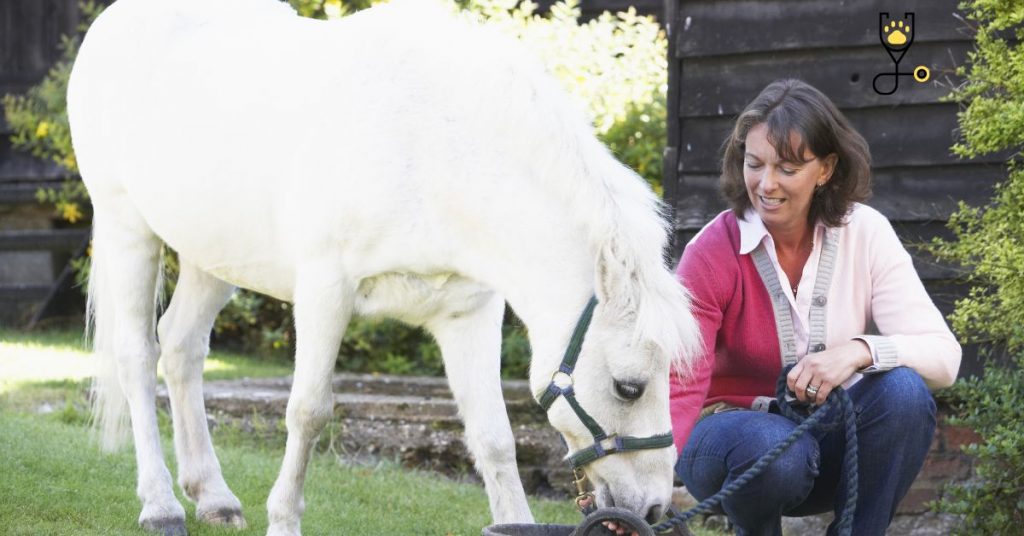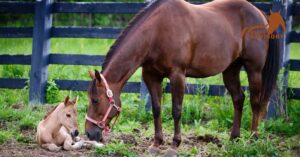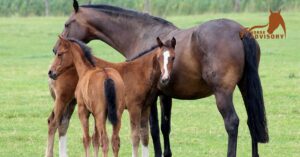There’s a lot of information out there about feeding horses, and it can be difficult to know what is the right thing to do for your pony. In this professional guide, we’ll break down all the different factors you need to consider when feeding your horse, from their age and weight to the type of hay they eat and how much water they should have. We also outline some common feed mistakes people make when caring for their horses, so you can be sure you are providing them with the best possible diet.
Nutritional Ponies Need
1. Age: Consider your pony’s age when deciding what kind of feed to provide for them. Colts and fillies need higher concentrations of protein, vitamins, and minerals than older horses to support their growth.
2. Weight: Make sure you are providing enough calories for your horse based on its size and body condition score. If they are overweight, reduce the amount of feed they get; if they are underweight, increase it.

3. Hay: The type of hay your pony eats can have a big impact on how much nutrition they get from their diet. Choose high-quality hay that is free from mold or dust particles, as these can be harmful to the horse’s health.
4. Water: Horses need access to clean, fresh water at all times. Make sure they have a plentiful supply of cool, clean water every day.
5. Supplements: Depending on your pony’s age and activity level, you may want to consider adding supplemental vitamins and minerals to their diet.
Feed Frequency & Amount
1. Frequency: How often you feed your horse can depend on its age and level of activity. Older horses may need to be fed twice a day, while younger horses may do better with three meals a day.
2. Amount: The amount you feed your horse should also depend on their age,
activity level, and body condition score. Generally speaking, an adult horse should get between 1-2% of its body weight in feed per day; for example, a 500-pound horse should get between 5-10 pounds of feed each day.

Water & Hydration
Ensuring your pony has access to clean, fresh water is essential for proper digestion and absorption of nutrients. Your pony should have access to a continuous supply of clean water throughout the day with changes at least twice a day and more frequently in hot weather.
Health & Wellness
1. Worming: Regular deworming is a must to keep your pony healthy and free from parasites. Work with your veterinarian to determine the best deworming schedule for your horse.
2. Vaccinations: Make sure you are following your veterinarian’s recommended vaccination schedule for your pony to help protect against common diseases and infections.
3. Hoof Care: Proper hoof care is essential for your pony’s health and wellbeing. Have their hooves trimmed regularly by an experienced farrier, and make sure they have plenty of time spent in turnout or on pasture so they can get the exercise they need to stay sound and healthy.
By following these steps, you can be sure that you are providing the best possible nutrition and care for your pony. Follow the guidelines outlined in this professional guide to keep them happy, healthy, and thriving.
Common Feed Mistakes
There are some common mistakes made when feeding ponies that you should be aware of in order to keep your horse healthy:
• Overfeeding concentrates – Concentrates such as grains or pellets should make up less than 15-20% of total feed intake, as having too much concentrate can lead to colic and other digestive issues.

• Not providing enough water – Ponies should have access to free-choice water throughout the day, as not drinking enough can lead to dehydration and heat exhaustion.
• Not providing enough hay – Hay should make up the majority of your pony’s diet and should be provided in quantities that meet their energy needs. Skimping on hay can lead to malnutrition and weight loss.
• Not providing adequate vitamins & minerals – Vitamins and minerals are essential for proper nutrition, and your pony’s diet should be supplemented with these nutrients if it is not meeting their requirements.
Feeding your pony a balanced, nutritious diet is essential for their health and well-being. By taking into account their age, size, activity level, and health status, you can ensure that you’re giving them the best possible nutrition so they can stay happy and healthy for years to come! Hopefully, this guide has provided some useful information on how to properly care for your pony. Happy feeding!
Conclusion
Feeding your pony a balanced, nutritious diet is essential for their overall health and well-being. The key to success is taking into account their age, size, activity level, and health status in order to customize their diet and meet all of their nutritional needs. Be sure to provide them with all the necessary nutrients, vitamins & minerals, clean water, and hoof care to keep them healthy and happy for years to come! Good luck on your feeding journey! Have fun along the way! 🙂
Frequently Asked Questions
Q: What type of hay should I feed my pony?
A: The best hay for your pony will depend on its particular needs. Standard grass-based hay such as Timothy, Orchard Grass, or Bermuda is typically best for horses in good body condition. If your horse is older or underweight, legume-based hay (such as alfalfa) may be recommended by your veterinarian. Work with an equine nutritionist to determine the best type of hay for your pony’s specific needs.
Q: How much water should my pony drink each day?
A: Ponies should have access to free-choice clean water throughout the day, and changes should be made twice a day at minimum. As a general rule, ponies should consume at least 5 gallons of water per day – more if they’re working hard or in hot weather. Make sure to monitor your pony’s water intake and adjust it according to its activity level and environmental conditions.
Q: What is the best deworming schedule for my horse?
A: The best deworming schedule for your horse will depend on a variety of factors, including age, breed, lifestyle, and environment. Consult with an equine veterinarian to determine the most appropriate deworming protocol for your specific horse.
Q: How often should I get my pony’s hooves trimmed?
A: Your pony’s hooves should be trimmed every 6-8 weeks. It’s important to keep your pony’s hooves trimmed and in good condition so that they can maintain proper balance and posture. Work with a qualified farrier or trimmer to determine the best schedule for trimming your pony’s hooves. Q: Are there any special considerations when feeding an older pony?
A: Yes, older ponies may have specific nutritional needs due to changes in metabolism, decreased activity levels, or dental issues. Work with an equine nutritionist and veterinarian to develop a diet plan that meets your senior pony’s particular needs and includes all necessary vitamins & minerals. Additionally, provide plenty of fiber-rich hay to help support digestion, as well as fresh clean water throughout the day.





